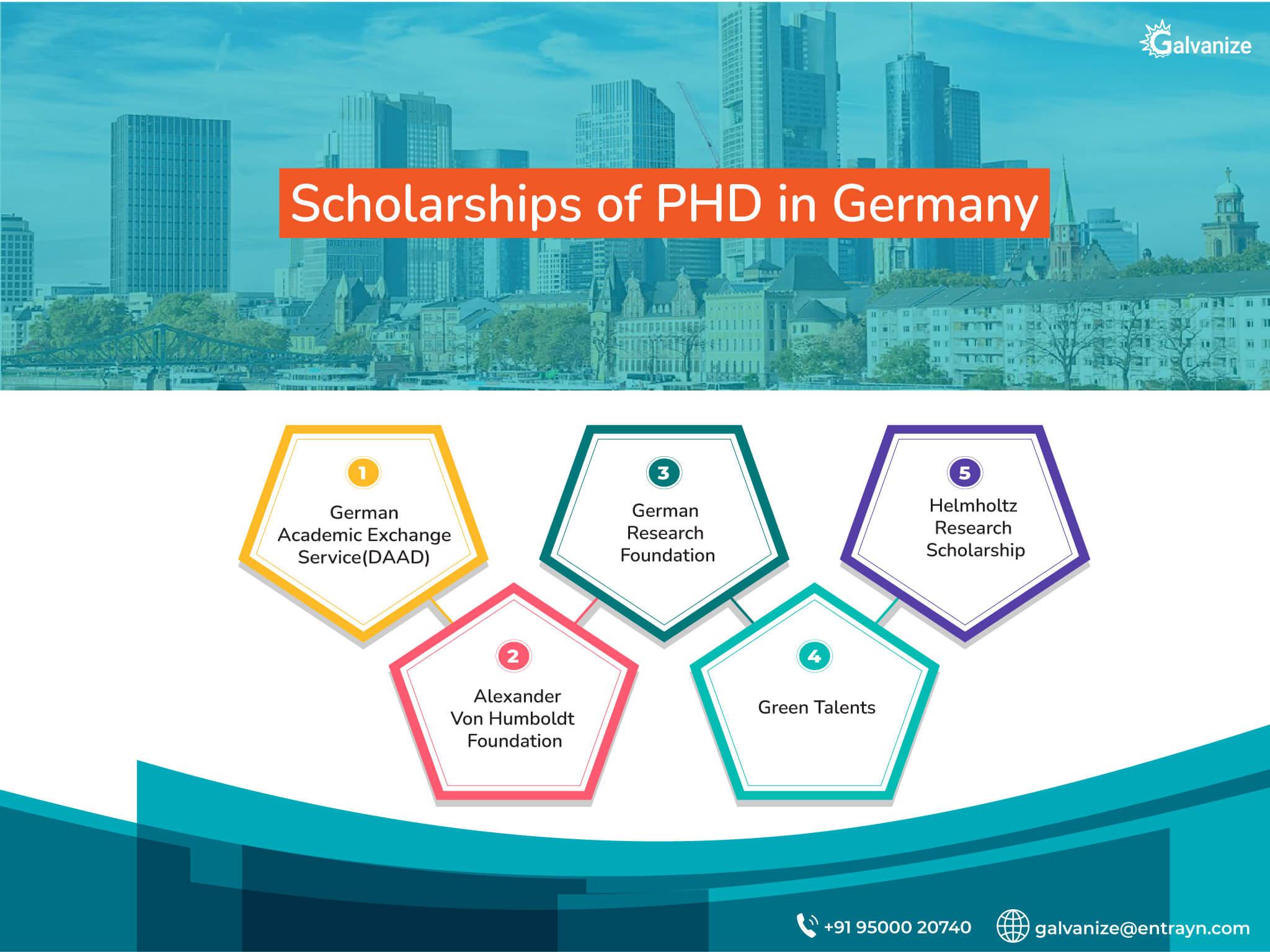
Chapter 1
Overview
With so many top-ranked colleges and lively towns brimming with history, exciting nightlife, and art galleries, it’s no surprise that thousands of young international students are choosing to study in Germany. In recent years, Germany has emerged as one of the most preferred study destinations for international students. It is, in fact, the third most common destination! But what is it about Germany that makes it so appealing to the international students?
In this post, you will learn all you need to know about pursuing PhD in Germany.
Why Study in Germany
Here’s why PhD in Germany can be a great option for you:
Almost Non-Existent Tuition Fees
Germany has made public colleges almost free since 2014 by eliminating tuition costs for both local and international students, particularly international students from outside Europe. For students from countries such as the United States, where tuition is a major worry, studying abroad in Germany is an excellent option.
Despite the fact that students must still pay tiny administrative fees, the overall cost of studying abroad in Germany can be fairly affordable when compared to what students might anticipate to pay in other locations.
Low Cost of Living
Tuition expenses, however, are only one factor that a potential study abroad student must consider when determining whether or not they have the financial resources to fund their education.
When it comes to the cost of living, studying abroad in Germany is relatively inexpensive. The German cities of Düsseldorf, Berlin, Hamburg, and Frankfurt all fell into the bottom 100 of the world’s most costly cities, according to the consulting firm Mercer, which releases data on the cost of living in 200 countries worldwide. Only Munich, at 98th place, made the top 100. Surprisingly, Berlin was placed 120th, making it one of the cheapest European capitals!
International Programs Participation
You can follow practically any interest by studying abroad in Germany as long as you have educational proficiency in English.
Many German universities offer distinguished degree programs exclusively in English in science, business, and humanities.
Another excellent resource for attracting overseas students to German universities is the German Academic Exchange Service (DAAD). There is a wealth of information available to help you transition your studies to Germany as smoothly as possible.
Economic Powerhouse
Germany’s economy remains to be the driving factor behind the European Union’s. Because Germany is a strong economic power, studying abroad in Germany can contribute to a plethora of job options.
If the names BMW, Siemens, Adidas, or Bosch sound recognizable, you’ve already been exposed to the best that German industry has to offer.
Although Germany has strict laws regarding international students working while studying, many universities offer lucrative internships and work experience that make them very desirable after graduation. Moreover, foreign students studying abroad in Germany with a proper visa will be granted an 18-month extension if they desire to find job and stay permanently in Germany.
Learn Dynamic Languages
Perhaps you’ve been seeking for inspiration to finally devote to learning a new language, or perhaps you simply want to strengthen the abilities you learnt in school. In any case, living and studying in Germany will provide you with an excellent opportunity to improve your German language skills.
For those who want to study German from native speakers, companies such as Lingoda offer 24/7 online sessions for a modest charge. There are numerous wonderful programs, such as Tandem and Duolingo, that will help you study German outside of the class for the more self-motivated learner.
What are the benefits of learning German? Even though many Germans can speak with foreign students in English, your experience will be even more personalized if you can communicate with inhabitants of your host country in their home language.
Moreover, German has been one of the official languages of the European Union, and also the corporate language of the majority of German firms. You boost your post-graduate employment by learning German while studying abroad in Germany. Furthermore, many Germans have achieved significant advances in the arts and sciences, making German a valuable skill whether you wish to study literature, chemistry, physics, or music, among other areas.
Remarkable Culture
With landscapes and cultures as varied as its population, studying abroad in Germany provides a plethora of options to immerse yourself in German culture in your own special way.
Whether you like to live in a more urban or rural setting, Germany has something intriguing to offer everyone. While studying abroad in Germany, explore Berlin’s pulsing nightlife, Dresden’s art scene, the scenic villages of the Black Forest, and Bavaria’s beer halls.
Great Food and Drink
No study abroad experience in Germany is complete unless you immerse yourself in the local cuisine.
Whatever your taste, Germany’s diverse food and beverage offerings will not disappoint. Test them out while studying in Germany!
To begin, Germany has over 1,000 distinct types of sausages and 1,500 different types of beers to select from. If you prefer currywurst, spätzle, black forest cake, schnitzel, pretzels, or lebkuchen, you’ll be just as satisfied.
History
No matter where you’re from, you’re probably aware of Germany’s historical significance.
Germany has been the site of some of the most major conflicts in the twenty-first century, from World War II to the Cold War. There are various memorials and buildings throughout Germany that commemorate the past.
Many sections of the Berlin Structure, for example, are still visible enabling visitors to get a glimpse of the formidable wall that once separated the city.
Soak in the Arts
Germany is recognized as a country of “poets and thinkers,” and this couldn’t be more accurate. Take the long list of artistic German brains, from Goethe to Beethoven to Kant, as evidence. The long legacy of admiration for the arts can still be observed today in the numerous art exhibitions, museums, and concert venues enjoyed by both inhabitants and tourists.
Consider the East Side Gallery, a major portion of the Berlin Wall that has been covered by world-renowned street art.
Through discounts on admissions for foreign students, studying abroad in Germany will present you with a once-in-a-lifetime opportunity to expand your awareness of some of the world’s best talents.
Don’t Miss the Opportunity to Travel
Whatever country you choose to study in, you will most certainly want to travel as often as possible. With nine distinct nations on its borders, studying abroad in Germany allows you to discover virtually the whole continent.
Aside from having so many neighbors, Germany has substantial public transportation. You can easily experience everything Germany has to offer by taking advantage of one of the world’s most reliable train networks. However, it does not end there.
Germany is also linked to the rest of Europe and the world by bus, ferry, and airplane. Furthermore, as a student studying abroad in Germany, you are entitled to student discounts on most modes of transportation.
About PHD in Germany
In Germany, a Ph.D. is a 2- to 6-year program that is free of tuition at the majority of public universities. Around 2,40,000 students were enrolled in German universities, with 7.5 percent obtaining a Ph.D. and 10.8 percent working on a research project. To pursue a doctoral program at a German university, you will most likely be asked to pay administrative costs (50 Euro) as well as contribution fees (250 Euro).
Ph.D. programs at German universities provide overseas students with a plethora of professional prospects in addition to world-class facilities. These doctoral programs are designed with international students in mind, with English as the medium of instruction. As a Ph.D. candidate, you should be aware of the following points:
- While studying in Germany, you will spend approximately 800-900 Euros per year.
- There are numerous Ph.D. scholarships available in Germany for foreign students, many of which cover the entire cost of the program.
- The processing time for a visa in Germany is at least 25 days.
- An interview is required as part of the Ph.D. admissions process.
Cost of PhD in Germany :
Germany is not just a country with a strong research system, but it is also a country that will not break the bank. Aside from tuition fees, the following are some of the costs you may face if you decide to study in Germany:
Pre-arrival Expenses
The sum of money you will spend before departing for Germany will include registration fee, travel expenses, payments for the student visa, and tests required to study in Germany. Some of these are as follows:
| Expense Type | Cost (in Euro) |
| IELTS fees | 229-233 |
| TOEFL fees | 228 |
| German Student Visa Schengen | 60 |
| German Student Visa | 75 |
| Health Insurance | 1236-1341 |
Tuition Fees for Ph.D. in Germany
Tuition fees are not generally charged at public universities in Germany. If you are unable to complete your Ph.D. on time, you will be asked to pay a semester fee. In this scenario, the fees differ from one university to the next. Furthermore, some private institutions do charge a fee, which might range between 300 and 3000 Euros each year.
Admission Requirements :
PhD entry criteria for Indian students in Germany vary depending on a variety of factors, including your education experience, nationality, institution, and course of study.
It is important to note that your qualifications obtained in India must first be recognised by the university or institution where you wish to attend. If it is determined that your master’s degree does not entitle you for PhD studies in Germany, you may still be enrolled after completing a fast-track preparatory course to give you the skills and competencies necessary in your standard PhD course.
Also, keep in mind that colleges in Germany may occasionally admit international undergraduate students who have demonstrated excellence in a comparable discipline.
According to the Proof of Language, the majority of PhD degree programs in Germany are taught in English. However, you must take an English proficiency test, such as the TOEFL or IELTS. Because the language employed at this educational level is advanced, you must strive for a high score otherwise the PhD provider in Germany may decline your application.
Language Fluency: English language proficiency is essential for the majority of international Ph.D. programs in Germany. Nevertheless, some standard Ph.D. programs require you to be fluent in German. The following are some of the score requirements:
| Tests | Score |
| TOEFL | 79+ |
| IELTS | 6.5+ |
| DSH | Level II |
| TestDaf | B2 or C1 |
Application Process :
It is time to present your application once you have found your PhD degree program and completed all essential documentation. Please remember that the details of the application process may be distinctive of the university to which you wish to apply; thus, you must approach your PhD provider for a thorough explanation of the application procedure.
After you have chosen an available professional teacher for your individual doctorate degree, a panel is usually in charge of selecting whether your academic profile meets exactly the vacant position in their PhD programs.
In this situation, the committee will require the following documents to determine whether you are the proper candidate.
- Certified copies of your qualifications
- A statement from your personal mentor
- Academic references
- Proof of Language Proficiency
It should be noted that applying for PhD studies in Germany can be done online by scanning your papers into PDF or JPG format. Please remember that the panel may be keen in doing a discussion with you through Skype. Essentially, the interview will revolve around your master’s studies and their relevance to the PhD program you wish to pursue.
Chapter 2
Top Universities for PhD in Germany :
Here are the top universities in Germany for PhD with the THE 2022 and QS 2022 rankings:
| University | THE 2022 | QS 2022 |
| LMU Munich | 32 | 64 |
| Technical University of Munich | 38 | =50 |
| Heidelberg University | =42 | 63 |
| Charité – Universitätsmedizin Berlin | 73 | – |
| Humbolt University of Berlin | 74 | =128 |
| University of Tübingen | =78 | =177 |
| Free University of Berlin | 83 | 127 |
| University of Freiburg | =108 | 172 |
| RWTH Aachen University | =108 | 165 |
| University of Bonn | 112 | =226 |
| University of Göttingen | =119 | 204 |
| University of Hamburg | =132 | 214 |
| Technical University of Berlin | 139 | 159 |
| University of Mannheim | =146 | 423 |
| Ulm University | =146 | =365 |
| University of Würzburg | 165 | =378 |
| Bielefeld University | 166 | 801-1000 |
| University of Cologne | =172 | =311 |
| TU Dresden | =194 | =173 |
| Karlsruhe Institute of Technology | 180 | 136 |
| University of Erlangen-Nuremburg | =197 | =322 |
| University of Hohenheim | =197 | 601-650 |
| Friedrich Schiller University Jena | 251-250 | – |
| University of Konstanz | 201-250 | 501-510 |
| University of Münster | 201-250 | 411 |
| University of Duisburg-Essen | 251-300 | 801-1000 |
| Heinrich Heine University Düsseldorf | 251-300 | – |
| University of Kiel | 251-300 | – |
| University of Potsdam | 251-300 | 701-750 |
| Ruhr University Bochum | 251-300 | =393 |
Chapter 3
Scholarships for PhD in Germany :
Scholarships and research funding are one of the main reasons that overseas students are drawn to Ph.D. programs in Germany. Some of the scholarships available while studying this program are included in the table below:
| Scholarship | Amount (in EUR) |
| German Academic Exchange Service(DAAD) | 1,200 |
| Alexander Von Humboldt Foundation | 3,170 |
| German Research Foundation | 1,350 |
| Green Talents | Funding for research |
| Helmholtz Research Scholarship | 3,700 |
University Jobs after PhD in Germany :
The following are the graduate salaries offered by Germany’s leading universities:
| Universities | Highest Package Offered (Euro/yr) |
| Darmstadt Technical University | 47,000 |
| Bonn University | 96,000 |
| Goethe University | 128,000 |
| Hamburg University | 240,000 |
| Gottingen University | 129,000 |
| Humboldt University of Berlin | 89,000 |
| University of Mannheim | 109,000 |
One advantage of Germany is that it attracts researchers in disciplines where they are scarce, such as engineering and information technology. As a result, the scope after completing a Ph.D. in Germany is broad. As a result, it is a wonderful option for prospective students.
Cost of Living in Germany :
Some of the expenses you will encounter while studying in Germany are listed below:
| Type of Expense | Monthly Cost (Euro) |
| Rent, Electricity, & Utilities | 323 |
| Food | 163 |
| Transportation | 85 |
| Entertainment | 61 |
| Books & Stationary | 20 |
FAQs
Q. What opportunities are available after getting a PhD in Germany?
Ans. Since one will be skilled at teaching, being a professor is the greatest career path for a Ph.D. candidate. You have the option of becoming a junior professor, a part of the Research and Development Team, or even working on business projects.
Q. How long is a PhD degree in Germany?
Ans. In Germany, a Ph.D. program typically lasts 2 to 6 years. Most science degrees take about 4 to 5 years, whereas arts courses might take up to 4 to 6 years.
Q. Which country is best for a PhD degree?
Ans. Canada, Germany, Japan, and Russia are among the finest countries for pursuing a Ph.D. These countries provide a diverse selection of course options at a reasonable cost.
Conclusion :
Students in Germany participate in a number of social activities, both at their colleges and throughout the cities. Take a train to Oktoberfest, attend an art festival, or spend a day at one of Germany’s numerous historic museums.
Germany is also known for providing a stimulating multicultural environment; you’ll be in classrooms with students from all over the world, and you’ll notice that multiple languages are spoken around the city you live in.
In your lessons, you will be expected to pay attention to the lectures, be regular, and show an interest in engaging. This may appear to be demanding, but you will find yourself growing and developing throughout your degree program.












Wants to persue Phd in germany
Wants to persue Phd in germany
Now Persuing M.Sc – Big Data Analitics
at
CENTRAL UNIVERSITY OF RAJASTHAN